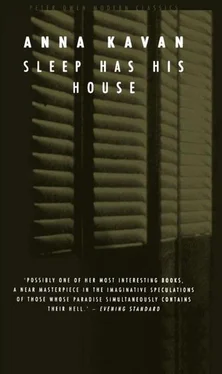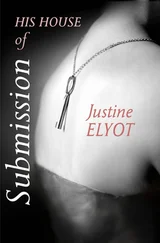A resumption of the professorial booming (for a very short period this time), with attention gradually concentrating on the curtains, which appear holding themselves with watchdog vigilance at their window post. Climax comes with the curtains coiling, the curtain tentacles extending, delicately glissading along the mask rows, turning the masks to the blackboard (the professor chalks up O); masks spectrally twitching and trilling in twisted unison; the curtain arms coil high to the ceiling, weave there; then return to the window, to stiff and full arm’s-length attention at each side of window, resume the same tense rigidity as before. As the wire vibration dies down, one after another, the masks topple, tumble, tip out of sight behind the benches. As the last one disappears the professor comes down from the hassock, from the dais, walks to the door of the lecture room.
Four seconds after he has gone out of the door the left curtain slowly draws itself across half the window. The right curtain slowly crosses to meet it.
A series of transient views tracks the professor’s progress from lecture room to outer door of college. His black-moth-gown seen fluttering down long perspective of shadowed, tunnel-like stone corridor; emerging into high-groined and vaulted entrance hall, the grey stones of the floor with faint localized stippling of amethyst, topaz, ruby light spillings from stained-glass windows.
Numerous indistinct indications of other figures, gowned professors, student masks topping garments on coat-hangers, wires, hockey-sticks; all flickering spasmodically in different directions; all very indefinite, ephemeral.
Finally, a static black-and-white punctuation mark, a heavy dark ancient door under gothic arch. An old man’s gnarled, unsteady, veined hand with border of frayed shirt-cuff, wear-shined and threadbare porter’s sleeve, draws back bolts, turns key, loosens chain, with rusty rasping, jarring complaint of unoiled metal.
The door slowly opens.
First the pepper-and-salt trousers, then the whole of the professor, stepping out of the door, crossing empty and sunlit pavement in the cracks of which wild flowers, daisies, harebells, cowslips, primroses, are in bloom. A toy motor-car, painted red, stands at the kerb. The professor packs and stuffs and forces himself into it; settles his feet on the pedals; squeezes a captious toot out of the rubber horn-bulb; vigorously pedals off. There is a squeaky noise from the chain driving the wire-spoked wheels. Short distance up street he signals with left arm stiffly extended; turns left, disappears. The chain squeak briefly outlasts him.
Now the professor pedalling home through the quiet streets of the town; not a real-life town, of course. The sunshine is filtered through pink gauze. Colleges, churches, museums, etc., like birthday cakes in the gauzy light. Cuckoos fly out of belfries and cupolas as the clocks strike.
The professor keeps on pedalling, passes the entrance to a street which is in shadow. Glimpse down this street, emphasizing its shadowed contrast to the rest of the town. About two hundred yards along it, facing another way, a mass of full-sized people crowds silently outside a municipal building, a town hall or a police station, very dark-looking, very ominous, introducing an abrupt note of alarm. The professor does not look. He keeps on pedalling.
The sunlit street ribbons on unbroken down a gentle slope with the white play-block house at the end of it. The car, without free-wheel, running faster and faster downhill; the professor’s knees pistoning faster and faster, almost grazing his chin.
Inside the house the woman who appeared earlier on is playing mah-jong with three visitors. These people are seen only in profile and are feminine, bloodless; with long proboscis noses, like Javanese silhouettes stamped out of metal, very frigidly and ophidianly malignant. The mah-jong tiles forming the walls behind which they are sitting are covered with money symbols, deeds, bonds, coins of various currencies; power symbols, sceptres, whips, bribes, $$$$ins; diapers, feeding bottles; phallic signs.
Rapid survey of this somewhat provincial pretentious drawing-room of a would-be-modern intellectual. Smooth, pale, faintly glazed planes of walls, built-in furniture, unstained woods: squarish, low, upholstered couch; easy chairs covered in zebra-stripe fabric: the emasculate fireplace, without mantelpiece, without fire, meekly impounded by chaste light wood bands: wall alcoves, interiorly tinted, and displaying such objects as negro carvings and/or very consciously quaint period pieces, china dogs, red and blue glinting lustres, wax flowers under fragile cloches. Bookshelves with volumes of philosophy, psychology by the more superficial writers, books issued by “advanced” publishers, a few up-to-the-moment novels, poems, pamphlets, “advanced” publications generally, a few literary quarterlies and art papers. There would be not more than two or three not-very-original paintings in pale frames on the walls: still life of the slick Slade student apple-and-wine-glass variety, or etiolated impressionist water-colour, or possibly pastel-smudged portrait or overloaded oil landscape in crude colour discords. There would probably be an absence of flowers in the room; or perhaps a single white pottery jar of tall grasses or shell flowers.
This room the professor enters in his black gown; with light short tripping steps advances across the neutral carpet; pirouettes; simpers and postures. He stands holding the pose, feet in the fifth position, skirts of his gown extended to fullest width and held between thumbs and forefingers, both little fingers curled and archly pointing.
In their alcoves the dangling glass lobes of the lustres begin to swing and oscillate gently, set up a faint tinkling applause.
Now a quick circling view of the whole rather phony prosperous enclosed room dithering faintly appreciative: into this circle, very complacent, the professor relaxes coyly from his pose: acknowledging the slight rustle of handclapping from the mahjong players he sits down in the exact centre of the couch.
The players rise from the table, group themselves round him. The visitors (always in profile) take positions on each side of him on the couch, the third sits on the floor at his feet. From attitudes of admiration their flat snake eyes are upon him in bitter malice, contempt or envy. His own woman is standing behind him, her face tiger-possessive, triumphant; she sets her fingers proprietorially on his head, absently twists his thin hair into kewpie tuft.
This tableau abruptly shattered by sudden rude surge of clamouring, knocking, at outer door of the house. With utmost possible effect of shock, enormous figures, in dark uniforms, bursting into the room, crowding in one after the other, surrounding the couch, brandishing, with threatening gestures, some document (Demand? Indictment?) under the professor’s nose.
He jumps up, astounded and outraged, thrusting the three visitors aside in rising (they collapse stiffly with metallic jingle and disappear); the woman behind the sofa gestures imperiously; calls out an unidentifiable order: she is at once submerged by the uniforms; seen struggling for a moment; disappears.
The professor is ringed, pressed on all sides by the massed uniforms, fear now coming out on his face like sweat. He glances round quickly, his face more and more afraid. He clutches his gown, pulls it higher and higher up round his shoulders, hunches his neck in it, muffles his head in its folds; and out of this hiding-place yells shrilly some protest or appeal, indignation in the start of the sounds, panic towards the end.
Two huge uniformed arms are extended from each side simultaneously.
They take hold of the gown, twitch at it derisively, contemptuously snatch it away.
Читать дальше












